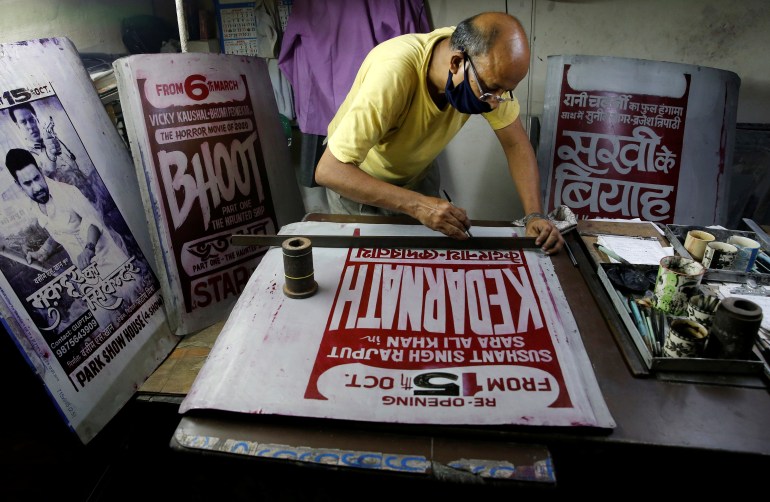Indian cinemas reopen amid fewest coronavirus deaths in 11 weeks | India
[ad_1]
After seven months of total blackout, cinemas have reopened in several parts of India as the country reported its lowest daily increase in coronavirus deaths in 11 weeks.
The reopening of movie theatres on Thursday came as India’s health ministry reported 680 deaths in the past 24 hours, the lowest number in nearly three months, raising the country’s death toll since the pandemic began to 111,266.
The country was seeing more than 1,000 virus-related deaths a day last month. The ministry also reported 67,708 new infections, raising India’s total to more than 7.3 million.
India has registered the highest number of daily cases globally and is expected to become the pandemic’s worst-hit country in the coming weeks, surpassing the United States.
 A graphic designer paints a Bollywood movie poster on an aluminium sheet inside a workshop ahead of the reopening of cinema halls in Kolkata [Rupak De Chowdhuri/Reuters]
A graphic designer paints a Bollywood movie poster on an aluminium sheet inside a workshop ahead of the reopening of cinema halls in Kolkata [Rupak De Chowdhuri/Reuters]
In March, nearly 10,000 Indian theatres were closed as part of coronavirus restrictions. Now, they will become one of the last few public places to reopen outside high-risk areas.
To minimise the danger of infections, seats have been separated. Show timings will be staggered and digital payment encouraged. Masks and temperature checks are mandatory.
“We have put everything into place, maybe more than what has been prescribed. The entire cinema touch points have been provided with anti-microbial films,” said Gagan Kapur, regional head of the PVR Cinemas in the capital, New Delhi.
Maharashtra, of which Mumbai – the home of Bollywood – is the capital, is the worst-hit state with nearly 37 percent of India’s COVID-19 deaths.
INOX Leisure Ltd, India’s second-largest multiplex operator, says the chain will only be screening old films.
“Right now, what we are working on is getting the confidence of people back by letting them know that the cinemas are safe and secure,” said Lalit Ojha, a regional director for the company.
 The management staff of a theatre in Bengaluru wait for the moviegoers to arrive [Manjunath Kiran/AFP]
The management staff of a theatre in Bengaluru wait for the moviegoers to arrive [Manjunath Kiran/AFP]‘Vicious circle’
Nervous producers have so far refrained from lining up any big-ticket releases, with many pushing their films directly to streaming platforms such as Netflix, Amazon Prime and Disney+ Hotstar following the pandemic closures.
“We are hoping to have a blockbuster release at Diwali,” Ojha said, referring to next month’s Hindu festival that usually spells a bonanza for theatres and retail businesses.
Although analysts point to pent-up demand for the big-screen experience among millions of cinema-crazy fans – India had nearly 1,800 releases in 2018 – many may not brave the trip just to watch old movies.
“It’s a vicious circle – people won’t come to cinemas unless there is fresh content. And producers won’t release a movie without some guarantee that it will do good business,” film trade analyst Komal Nahta told the AFP news agency.
“Ultimately, someone will have to take a chance and release an exciting film,” he said.
A handful of producers are reportedly ready to take the risk, with at least one Hindi film, Suraj Pe Mangal Bhari, due for release on November 13, the Diwali weekend.
Top Bollywood producer Aditya Chopra is also preparing to release Bunty Aur Babli 2, a sequel to a 2005 hit, at the same time, according to media reports.
 A man wearing a face mask walks past the ticket counter of a movie theatre in New Delhi [Shonal Ganguly/AP]
A man wearing a face mask walks past the ticket counter of a movie theatre in New Delhi [Shonal Ganguly/AP]
But Indian health officials have warned about the potential for the virus to spread during the festival season beginning later this month.
“The next two-and-a-half months are going to be very crucial for us in our fight against corona because of the winter season and the festival season,” Health Minister Harsh Vardhan said on Wednesday.
“It becomes the responsibility of every citizen to not let our guard down and follow COVID-19 appropriate behaviour to curb the spread of the infection.”
[ad_2]
SOURCE NEWS

